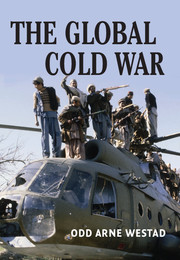Book contents
- Frontmatter
- Contents
- List of illustrations
- List of maps
- Acknowledgments
- List of abbreviations
- Introduction
- 1 The empire of liberty: American ideology and foreign interventions
- 2 The empire of justice: Soviet ideology and foreign interventions
- 3 The revolutionaries: anticolonial politics and transformations
- 4 Creating the Third World: the United States confronts revolution
- 5 The Cuban and Vietnamese challenges
- 6 The crisis of decolonization: Southern Africa
- 7 The prospects of socialism: Ethiopia and the Horn
- 8 The Islamist defiance: Iran and Afghanistan
- 9 The 1980s: the Reagan offensive
- 10 The Gorbachev withdrawal and the end of the Cold War
- Conclusion: Revolutions, interventions, and great power collapse
- Notes
- Index
Introduction
Published online by Cambridge University Press: 05 December 2012
- Frontmatter
- Contents
- List of illustrations
- List of maps
- Acknowledgments
- List of abbreviations
- Introduction
- 1 The empire of liberty: American ideology and foreign interventions
- 2 The empire of justice: Soviet ideology and foreign interventions
- 3 The revolutionaries: anticolonial politics and transformations
- 4 Creating the Third World: the United States confronts revolution
- 5 The Cuban and Vietnamese challenges
- 6 The crisis of decolonization: Southern Africa
- 7 The prospects of socialism: Ethiopia and the Horn
- 8 The Islamist defiance: Iran and Afghanistan
- 9 The 1980s: the Reagan offensive
- 10 The Gorbachev withdrawal and the end of the Cold War
- Conclusion: Revolutions, interventions, and great power collapse
- Notes
- Index
Summary
“We look into history from motives of two kinds,” says the Oxford classicist Jasper Griffin. “There is curiosity about the past, what happened, who did what, and why; and there is the hope to understand the present, how to place and interpret our own times, experiences, and hopes for the future.” As with the history of antiquity, the best contemporary history is usually driven by both kinds of motives; those that see the past as past and those that see the past as present. In the spirit of Professor Griffin's injunction, this is a book about the creation of today's world, about how the mightiest powers of the late twentieth century – the United States and the Soviet Union – repeatedly intervened in processes of change in Africa, Asia, and Latin America, and through these interventions fuelled many of the states, movements, and ideologies that increasingly dominate international affairs. In its choice of topic it is, in other words, an unabashedly presentist book, even though it is also an historical account, written by a historian.
The volume grew out of my interest in the motives and decisions of the Cold War superpowers in their Third World policies, which I felt needed to be reinvestigated now that archival materials from both sides are available for the first time. During the research, however, the subject of the book turned into something broader: I found it impossible to understand Moscow's and Washington's decisions without exploring both the ideological origins of their Cold War interventionisms and the transformation of Third World politics that precipitated the superpower involvement.
Information
- Type
- Chapter
- Information
- The Global Cold WarThird World Interventions and the Making of Our Times, pp. 1 - 7Publisher: Cambridge University PressPrint publication year: 2005
